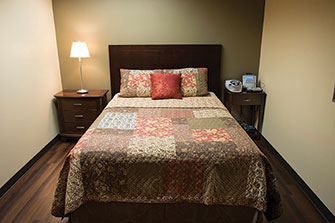Sleep study
What is a sleep study?

A sleep study means that you actually stay overnight at HonorHealth's Sleep Health Center for evaluation of what may be causing sleep disruption.
Trained technicians monitor variables such as brain waves, breathing patterns, eye movement, blood oxygen levels and other factors. A sleep medicine specialist interprets them and routes the findings to your referring physician.
Polysomnography – an overnight sleep recording – is the single most comprehensive diagnostic tool for sleep-related complaints. When indicated for a patient, polysomnography can assist in accurate diagnosis and treatment of many types of sleep disorders including the following:
- Sleep apnea
- Narcolepsy
- Restless leg syndrome
- Snoring
- Insomnia
- Circadian rhythm disorders
- Sleepwalking/sleep talking
How it works
Your primary care physician may refer you to HonorHealth's Sleep Health Center. You'll meet with a doctor who specializes in sleep medicine for an initial consultation if ordered by your referring physician. If a sleep study is indicated, you'll set up an appointment for an overnight stay.
On the day of your sleep study, you'll want to avoid caffeine — coffee, tea, colas, chocolate — after 2 p.m. and avoid napping. Pack an overnight bag as you would for a hotel stay. If you have special needs, please inform staff at the center before your scheduled appointment. If you have prescribed medications that you take at bedtime, bring them with you.
When you arrive for your appointment, register at the admitting desk. Please don't forget to bring your insurance card and identification such as a driver's license. After you've registered, a sleep technician will show you to your room.
After you've settled in, you'll be asked to complete a pre-sleep questionnaire and prepare for bed. The sleep technician will then apply the sensors required to record your sleep. Starting at the top of your head:
- Seven electrodes will be pasted to your scalp and behind your ears to record brain activity (sleep)
- An electrode will be taped beside each eye to record eye movement
- Two electrodes will be taped to your chin to record muscle activity
- A small microphone will be taped to the base of your neck to detect snoring
- Two electrodes will be taped to your chest to record an EKG
- A sensor will be placed beneath your nose to record airflow
- An elastic band will be placed around your chest and another around your abdomen to record the effort of breathing
- An electrode will be taped to each leg to record movement
- A sensor will be taped to your index finger to record the oxygen saturation of your blood
After all of the sensors have been applied, you'll relax in your room. You can read, watch TV or work on a project from your job. When you begin to feel sleepy, let the sleep technician know; you'll be tucked in and the lights turned off. Ideally, you'll be ready for sleep no later than 11 p.m.
In the morning, the study will end, and all sensors will be removed by the sleep technician. You may then shower and get dressed. You'll be asked to complete a post-sleep questionnaire before you leave.